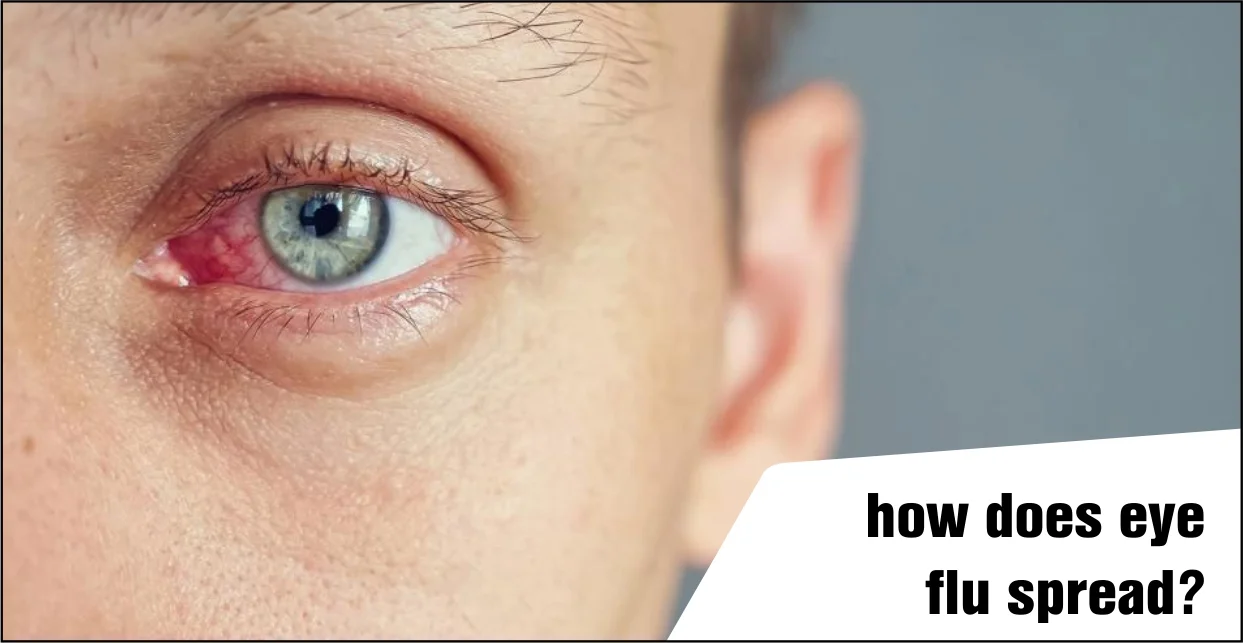Eye flu, also referred to as Conjunctivitis or pink eye, is a highly contagious eye infection that affects millions worldwide. To avail the best treatments for eye flu, you can visit Eye Q Hospitals chains in India. It is one of the leading hospital chains offering top-notch medical services for all eye-related complications. We have the best eye doctors who can provide the most reliable treatments for curing pink eye.
Do you know how does eye flu spread? It is a common question people ask. Having adequate knowledge about the transmission methods of conjunctivitis can help you take the appropriate preventive measures and protect yourself and your loved ones. This blog briefly discusses the transmission methods, risk factors, symptoms, preventive measures, and treatments available for eye flu.
What is Eye Flu?
The inflammation of the conjunctiva, the thin eye membrane of the white part, is called eye flue or conjunctivitis. Multiple factors may lead to this health condition:
- Viruses (adenovirus, herpes simplex)
- Bacteria (Staphylococcus aureus, Haemophilus influenzae)
- Allergens (pollen, dust, pet dander)
The Eye Q Hospitals chain in India offers the best treatment and care for eye flu. You can consult the leading eye doctors of India here and get the most assured medical guidance. Please book an appointment with us today for the best eye care!
Conjunctivitis Transmission: How Does Eye Flu Spread?
How does conjunctivitis spread? The transmission methods of conjunctivitis or eye flue are as follows:
-
Direct Contact
One of the most prominent transmission methods of eye flu is direct contact. If you get in direct contact with an infected person’s eyes, eyelids, or surrounding areas, the infection can get transmitted. All sorts of physical contact with an infected person like touching, hugging, shaking hands, kissing, etc., may lead to the transmission of eye flu.
-
Indirect Contact
Eye flue is highly contagious; thus, it can spread rapidly even without direct contact. If you get in Indirect contact with a contaminated person, you might develop the infection as well. The infection can spread through sharing towels, pillows, blankets, touching door handles, light switches, etc. Our leading eye doctors offer excellent medical assistance for coping with conjunctivitis. So, if you develop pink eye through indirect contact with an infected person, visit our hospital as soon as possible!
-
Droplet Transmission
It is another common type of transmission method, leading to eye flu. Droplet transmission refers to the transmission of eye flu when an infected person coughs, sneezes, or talks, releasing droplets that contain the virus. Going in close proximity to an infected person or sharing the same air space are the major reasons behind droplet transmission.
-
Contaminated Surfaces
It is another common method of eye flu transmission among individuals worldwide. Contaminated surfaces can greatly harbor the virus, thereby allowing it to spread vividly. So, you can develop pink eye or eye flu by touching surfaces contaminated with discharge, tears, etc. Also, sharing the same makeup brushes, combs, etc., can make you prone to developing eye flu.
-
Vector-Borne Transmission
Did you know that eye flu can be transmitted by various insects as well? Vectors like mosquitos and flies can greatly trigger pink eye in individuals by transmitting the infection. When these vectors sit on a contaminated surface, they carry along the bacteria and viruses wherever they fly. So, when you come in contact with an area or object the vector has landed on, you develop greater possibilities of developing conjunctivitis.
Conjunctivitis Risk Factors
Now that you have the answer to your question, ‘How does eye flu spread?’, let’s make you aware of the major risk factors for pink eye. Multiple risk factors can lead to the development of eye flu, like age, environmental factors, personal hygiene practices, behavioral habits, health conditions, etc. Here’s a comprehensive guide to learn about the most significant risk factors for eye flu:
-
School-age children
Children between the age groups of 6 to 14 are most likely to develop this eye condition since they might get in close contact with other infected students. To keep the younger ones protected, you should get them vaccinated at the earliest. Also, you should teach your children to practice good personal hygiene habits like not touching their eyes, mouth, or nose, especially after touching potentially contaminated surfaces.
-
Healthcare workers
Healthcare workers can also develop frequent eye flu due to droplet transmission or surface contamination. To keep yourself protected, always wear protective gear like gloves and masks when caring for individuals infected with eye flu. You should also get vaccinated for additional protection against this health condition.
-
People with Weakened Immune Systems
Individuals with a weak immune system are more likely to get affected by conjunctivitis than people with a good immune system. You can consider consuming a healthy diet, following good oral hygiene, and staying under the supervision of renowned eye doctors to reduce the possibility of developing pink eye. The eye specialists at Eye Q Hospitals chains in India can provide the best medical supervision.
-
Those with Pre-Existing Eye Conditions
Individuals with pre-existing eye conditions like cataracts, dry-eye syndrome, blepharitis, glaucoma, macular degeneration, eye trauma, corneal abrasions, etc., are more prone to developing this health issue. If you want to get the most refined eye care, book your appointment with Eye Q Hospitals chains in India today! With us, you can avail of the best solutions for eye flu, and all other similar eye problems at comprehensive pricing.
-
Poor Hygiene Practices
Improper hygiene practices like not washing hands regularly, not covering mouth while eating, touching the face of eyes repeatedly, and sharing personal items like makeup equipment, toys, pillows, handkerchieves, brushes, etc., can increase the risk of eye flu. So, Wash your hands frequently with soap and water, and avoid sharing towels, pillows, makeup, or contact lenses.
-
Crowded Areas
Staying in crowded areas for prolonged periods can increase the risk of developing pink eye. Also, traveling to places with decreased sanitation can be a major risk factor to consider. As a preventive measure, you can wear the necessary protective gear and get vaccinated to reduce the possibility of developing eye flu. Also, refrain from touching public surfaces since they may be contaminated with viruses and bacteria.
-
Poor Ventilation
Places with poor ventilation greatly nurture the scope for viruses to linger in the air longer. Thus, you should always stay in well-ventilated rooms that facilitate the free transmission of wind. It will help maintain an optimal oxygen level in the room and ensure safer health. Damp rooms should also be avoided since such viruses can thrive well in areas with high moisture content.
Conjunctivitis Symptoms
You must have adequate knowledge about the common eye flu symptoms to avail yourself of early intervention and care. Consult the trusted eye doctors of Eye Q, the most reliable hospital chain in India, to receive the best preventative care if you experience the following eye flu symptoms:
- Redness and inflammation
- Itching or burning sensations
- Discharge or crusting
- Blurred vision
- Sensitivity to light
- Eye fatigue
- Sore throat
- Nose congestion
- Increased tear production
- Swollen eyelids
- Fever
- Eye pain or pressure
- Headache
- Loss of appetite
- Swollen lymph nodes
- A general feeling of illness
- Facial pain
Best Treatment Approaches for Eye Flu
Besides knowing how does eye flu spread, learning about the treatment approaches is essential as well for your well-being. The eye doctors at Eye Q Hospitals chains offer the following treatment approaches for the efficient cure and management of pink eye:
-
Antibiotic Eye Drops or Ointments
Our doctors may recommend topical eye drops or ointments for coping with bacterial conjunctivitis. However, every individual has distinct requirements. Therefore, depending on the severity of your eye flu, our doctors can accordingly personalize your treatment to yield the best outcomes.
-
Antiviral medications
If you are suffering from viral eye flu, you will be prescribed antiviral medications. It will ease the symptoms of viral conjunctivitis and promote overall well-being. You can book an appointment with our leading eye doctors at Eye Q Hospitals, India, to get more insights into your eye flu treatments.
-
Allergy medications
Eye flu or conjunctivitis may also result from allergic reactions. Therefore, if you are suffering from allergic conjunctivitis, our eye doctors may prescribe the best allergy medications like steroid eye drops, etc. Visit us for custom treatment packages and experience the latest medical infrastructure like outpatient department, surgical services, retinal camera, etc., at Eye Q Hospitals chains for the best patient outcomes.
-
Eye Irrigation
It is a commonly used treatment highly effective for coping with pink eye. In this procedure, our eye specialists will flush your eyes with saline solution to remove infections. Our medical professionals conduct the safest eye irrigations to ensure optimal eye health.
-
Supportive care
Our expert medical team offers the best supportive care to cope with such as warm compresses, artificial tears, etc. Visit your nearest Eye Q Hospitals in India for considerable eye care by the best doctors.
Final Words
Eye flu is a rapidly spreading contagious infection. Thus, understanding how does eye flu spread helps in taking preventive measures on time. If you see your conjunctivitis symptoms persisting or worsening, immediately seek medical assistance from Eye Q Hospitals chains in India, the most reliable medical facility for treating eye flu.




